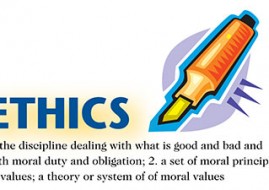Lawyer’s Incivility Provokes Three-Month Suspension
By Hal R. Lieberman [Originally published in NYPRR July 1999]
In 1993, I wrote an article for the New York Law Journal entitled, “Lawyer Incivility Is Also Unethical.” [See, NYLJ, 11/15/93, p. 1, col. 1.] The article described three cases decided by the First Department’s Appellate Division in which New York lawyers were publicly disciplined for insulting opposing counsel, disparaging a judge in personal and sexist terms before the press, and making vulgar, pejorative comments in the course of a deposition. My purpose at the time was to show that lawyers in our jurisdiction cannot assume that behavior of this nature will somehow be ignored by the disciplinary authorities, or otherwise glossed over as zealous advocacy or protected speech under the First Amendment.
Apparently, attorney Philip J. Dinhofer did not hear the message. During a 1997 telephone status conference with Judge Loretta Preska of the U.S. District Court, Southern District of New York, Mr. Dinhofer, appearing on behalf of his client, made the following statements, among others, to the Court:
“This is rampant corruption. I don’t know what else to say. This is a sham.”
“This is blatantly corrupt. You are sticking it to me every way you can.”
“I’m not rude to them [a reference to the Court’s staff], I’m rude to you, because I think you deserve it. You are corrupt and you stink. That’s my honest opinion, and I will tell you to your face.”
Judge Refers Complaint to Grievance Committee
Needless to say, Judge Preska did not take kindly to these insults, and referred the matter to the Federal Grievance Committee. Mr. Dinhofer was thereupon charged with violating Disciplinary Rules 1-102(A)(5) and (8) and DR 7-106(C)(6) of the New York Code of Professional Responsibility based upon the foregoing statements. Following a hearing before a Panel of the Federal Grievance Committee solely on the issue of an appropriate sanction (Mr. Dinhofer admitted that he made the subject remarks and apologized to Judge Preska), on Nov. 2, 1998 the Southern District publicly censured Mr. Dinhofer. But his troubles were far from over.
After referral to the First Department’s Departmental Disciplinary Committee (DDC) for the imposition of reciprocal discipline [22 NYCRR §603.3], the DDC likewise recommended a public censure of Mr. Dinhofer predicated upon similar discipline ordered by the Southern District. However, the First Department declined to follow the DDC’s recommendation, and instead, on May 20, 1999, imposed a three-month suspension upon Mr. Dinhofer. The Department held in pertinent part:
“…we find that a three-month suspension is an appropriate sanction. The record reflects that comments made by respondent were derogatory, undignified and inexcusable.”
The lesson in all of this? Lawyer incivility is not only unethical — it can be very harmful to a lawyer’s reputation and livelihood. (The First Department’s decision may be found at 1999 N.Y. App. Div. LEXIS 5531.)
Hal R. Lieberman was formerly Chief Counsel to the Departmental Disciplinary Committee, First Department and is now counsel to the firm of Beldock, Levine, & Hoffman, LLP, in New York City.
DISCLAIMER: This article provides general coverage of its subject area and is presented to the reader for informational purposes only with the understanding that the laws governing legal ethics and professional responsibility are always changing. The information in this article is not a substitute for legal advice and may not be suitable in a particular situation. Consult your attorney for legal advice. New York Legal Ethics Reporter provides this article with the understanding that neither New York Legal Ethics Reporter LLC, nor Frankfurt Kurnit Klein & Selz, nor Hofstra University, nor their representatives, nor any of the authors are engaged herein in rendering legal advice. New York Legal Ethics Reporter LLC, Frankfurt Kurnit Klein & Selz, Hofstra University, their representatives, and the authors shall not be liable for any damages resulting from any error, inaccuracy, or omission.
Related Posts
« Conflicts of Interest in Adoption Proceedings Limits on Proper Acceptance of Client’s Story »












